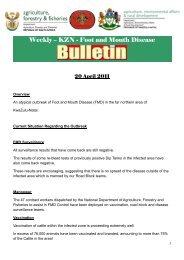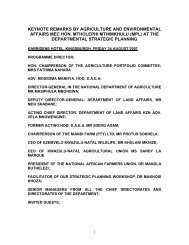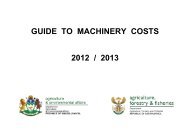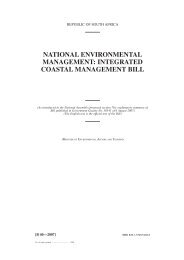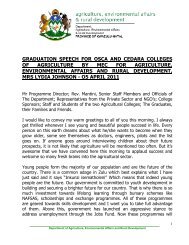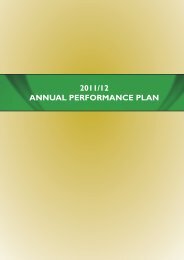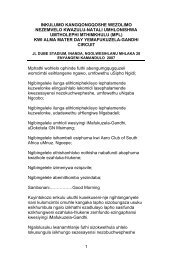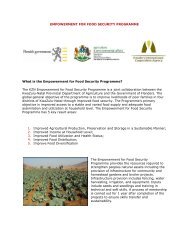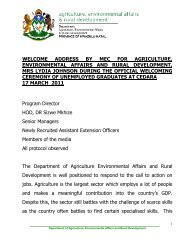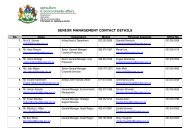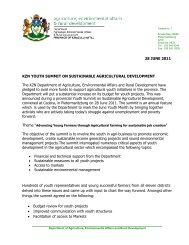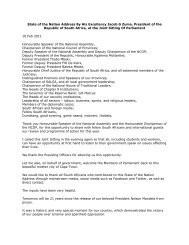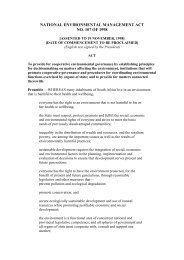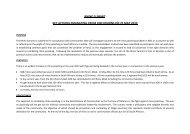Socio-Economic Report - Department of Agriculture and ...
Socio-Economic Report - Department of Agriculture and ...
Socio-Economic Report - Department of Agriculture and ...
Create successful ePaper yourself
Turn your PDF publications into a flip-book with our unique Google optimized e-Paper software.
UDM ENVIRONMENTAL MANAGEMENT FRAMEWORK<br />
This legislation provides for His Majesty the King to be the sole trustee but in terms<br />
<strong>of</strong> the 1997 amendments the Board came into operation on the 2 October 1998 to<br />
actually administer the affairs <strong>of</strong> the Trust. The Chairperson <strong>of</strong> the Board is His<br />
Majesty the King or his nominee. The members are appointed by the Minister,<br />
subject to consultative procedures laid down in the Act.<br />
The core business <strong>of</strong> the Trust is to manage the l<strong>and</strong> for the “material benefit <strong>and</strong><br />
social well being <strong>of</strong> the individual members <strong>of</strong> the tribes”. However, no alienation or<br />
burdening <strong>of</strong> the l<strong>and</strong> may occur without the written permission <strong>of</strong> the relevant<br />
traditional or community authority.<br />
FREE BASIC WATER POLICY<br />
The Free Basic Water Policy was introduced in 2000 recognising the importance <strong>of</strong><br />
having a clean <strong>and</strong> adequate water supply. The policy allows that every household to<br />
get 6 000 litres <strong>of</strong> water per month at no cost within a 200 metre distance from a<br />
household (Hall, Leatt, & Monson, 2006).<br />
It is up to municipalities to ensure that the policy is implemented, as three targeting<br />
options are provided:<br />
1. Rising Block Tariff: with access to taps <strong>and</strong> meters, the free 6 000 litres<br />
(block) is provided to water users <strong>and</strong> there after subsequent usage (or block)<br />
is billed at increasing rates for increasing consumption.<br />
2. Targeted Credits or Subsidies: where people are considered “indigent” a<br />
subsidies amount is credited to their bill monthly.<br />
3. Service Level Targeting: this option limits access <strong>of</strong> water to the minimum 6<br />
000 litres per month. This is provided for either through a communal tap<br />
system which is within the 200 meter service level.<br />
UMKHANYAKUDE DISTRICT MUNICIPALITY: INDIGENT POLICY<br />
Due to the high levels <strong>of</strong> poverty <strong>and</strong> unemployment in the uMkhanyakude, the<br />
municipality has adopted an indigent policy to assist households who are unable to<br />
pay for normal municipal services (uMkhanyakude District Municipality, 2005).<br />
The policy states: “households with a verified total gross monthly income <strong>of</strong> all<br />
occupants over 18 years <strong>of</strong> age does not exceed R800.00, or such other amount as<br />
the uMkhanyakude Municipal Council may from time to time determine, qualify for a<br />
subsidy on property rates <strong>and</strong> service charges for sewerage <strong>and</strong> refuse removal”<br />
(uMkhanyakude District Municipality, 2005).<br />
Households have to register annually to qualify as indigent which qualifies them for<br />
relief on services such as refuse removal <strong>and</strong> property rates.<br />
<strong>Socio</strong>-<strong>Economic</strong> Assessment Page 16



